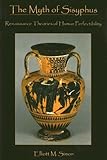The myth of Sisyphus : Camus Albert
Publication details: London Penguin Books c2005Description: 614 p. ; 25 cmISBN:- 9780838641163 (alk. paper)
- 0838641164 (alk. paper)
- 194 CAM 22
- BD233 .S56 2007
| Item type | Current library | Call number | Status | Date due | Barcode |
|---|---|---|---|---|---|
 BOOKs
BOOKs
|
National Law School | 194 CAM (Browse shelf(Opens below)) | Available | 36932 |
Includes bibliographical references (p. 544-595) and index.
Contents
Acknowledgments
Introduction: Myth and the Quest for Human Excellence.
1. The Myth of Sisyphus and the archetypal idealization of process over achievement.
2. The Stoic Sisyphus.
The Sisyphean archetype and quest for moral perfectibility in Stoic philosophy from Zeno, Chrysippus, Epictetus, and Seneca to Cicero and Marcus Aurelius
3. Three: The Patristic Sisyphus.
The spiritual quest for faith and redemption in the works of Origen, Arnobius, Clement of Alexandria, St. Jerome, St. Ambrose, and St. Augustine,
4. Sisyphus in Medieval and Renaissance Mythography.
Moral and allegorical versions and interpretations of the myth of Sisyphus in the works of Lactantius Fulgentius, Isidore of Seville, John Ridewall, Giovanni Boccaccio, Thomas Cooper, Giglio Giraldi, Natale Conti, Vicenzo Cartari, Abraham Fraunce, Henry Peacham, Stephen Bateman, and Alexander Ross.
5. Sisyphus as Astral Magician.
The quest for human and material perfectibility through astrology, alchemy, and astral magic in the works of Pico della Mirandola, Marsilio Ficino, Johannes Reuchlin, Heinrich Cornelius Agrippa, Paracelsus, and John Dee.
6. Sisyphus as Humanist.
I. Humanism and the dignity of man in the works of Petrarch, Coluccio Salutati, Leonardo Bruni, Poggio Bracciolini, Bartolomeo Facio, Platina, Lorenzo Valla, Nicholas Cusanus, Giannozzo Manetti, Marsilio Ficino, Pico della Mirandola, and Pietro Pomponazzi.
II. Humanism and eugenic education in the works of Erasmus, Juan Luis Vives, Martin Luther, Philip Melanchthon, Thomas Cromwell, Thomas Elyot, and Roger Ascham.
III. Humanism and utopianism in Thomas More's Utopia, Francis Bacon's New Atlantis, Tommaso Campanella's The City of the Sun, and Johan Valentin Andreae's Christianopolis.
7. Sisyphus as Lover
I. Philo Judaeus, Plato, Plotinus, and Nicholas Cusanus: on divine love.
II. Plato and Marsilio Ficino on Platonic love in the Symposium and the Commentary on Plato's Symposium.
III. The Renaissance love dialogues of Leone Ebreo's (Judah Abravanel) Dialoghi d'Amore [The Philosophy of Love] and Pietro Bembo's Gli Asolani.
IV. Giordano Bruno, De gli eroici furori [Of heroic frenzies] of the Sisyphean lover.
V. Francesco Petrarch's erotic and spiritual lover in Il Canzoniere.
VI. Pierre de Ronsard's perfectibility of sensual love in Les Amours de Cassandre and Sonets pour H¿l¿ne.
VII. Sir Philip Sidney and the aspirations and follies of the unrequited lover in Astrophil and Stella.
8. Sisyphus as Hero
I. Ancient, Medieval, and Renaissance conceptions of the hero and heroic action.
II. The Sisyphean hero in medieval romance: Thomas Malory's Morte d'Arthur.
III. The indeterminate perfectibility of the courtier hero: Baldassare Castiglione's Il libro del Cortegiano [The Book of the Courtier].
IV. Edmund Spenser's Sisyphean heroes in The Faerie Queene: Prince Arthur.
V. The Red Crosse Knight and the mysteries of holiness.
VI. Sir Guyon's paradoxical discipline of Stoic temperance.
VII. Britomart's quest for human perfectibility through the mythical transformations of chaste love.
VIII. Sir Artegall's ascending and descending forms of justice.
IX. Sir Calidore: the endless labor of human perfectibility through courtesy in life and in art.
Notes
Bibliography
Index

There are no comments on this title.